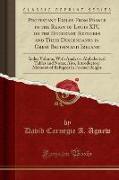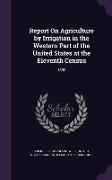- Start
- Protestant Exiles From France in the Reign of Louis XIV, or the Huguenot Refugees and Their Descendants in Great Britain and Ireland
Protestant Exiles From France in the Reign of Louis XIV, or the Huguenot Refugees and Their Descendants in Great Britain and Ireland
Angebote / Angebote:
Excerpt from Protestant Exiles From France in the Reign of Louis XIV, or the Huguenot Refugees and Their Descendants in Great Britain and Ireland: Index Volume, With Analysis, Alphabetical Tables and Notes, Also, Introductory Memoirs of Refugees in Former Reigns
Henry III. Succeeded Charles IX. In 1574, but his reign must here be passed over. When he was assassinated in the camp near Paris in 1589, the Protestants under King Henry of Navarre were in his army, taking the loyal Side against the rebellious Roman Catholic League. The Papists continued the rebellion, with a view to displace Henry Of Navarre from the throne Of France, which was his rightful inheritance, and thus the Protestants, being evidently loyal still, require no apologist.
It is alleged, however, that by now becoming a party to a treaty with the king of the country, the Protestant Church of France assumed an imperial position which no civilised empire can tolerate, and that, therefore, the suppression of that Church by Louis XIV., though executed with indefensible cruelty, was the dictate of political necessity.
The reply to this allegation is, that this treaty was only the re-enactment and further extension Of a peculiar method of tolerating Protestants, devised by the kings of France as the only plan to evade the necessity of being intolerant, which the coronation oath made them swear to be. The plea that Protestants, as religionists, were not implicitly subject to the King, but were to be negotiated with like a foreign power, was the only apology for tolerating them, consistent even with the modified oath sworn by Henry IV. I will endeavour, to the utmost of my power, and in good faith, to drive out of my jurisdiction and from the lands under my sway all heretics denounced by the Church of Rome. As to this political treaty with the Huguenots in its first shape, Professor Anderson* remarks, Instead of religious toleration being secured to them by a powerfully administered law, their protection was left in their own hands, as if there was something in their creed which must for ever render them incapable of amalgamating with other Frenchmen.
Royalty, which planned the treaty, was at least as guilty as the Protestant Church, which entered into the plan. If persecution and extinction were the righteous wages of the transaction, the humbler accomplice was not the only party that had earned them. The only crime was consent to a royal programme, to which the successors of Henri IV. Made themselves parties by deliberate and repeated declarations. The treaty to which we allude is the celebrated Edict of Nantes, dated 1598, as a pledge of the observance of which the Protestant Church received several towns, with garrisons and ammunition, to be held and defended by their own party in independent feudal style.
About the Publisher
Forgotten Books publishes hundreds of thousands of rare and classic books. Find more at www.forgottenbooks.com
This book is a reproduction of an important historical work. Forgotten Books uses state-of-the-art technology to digitally reconstruct the work, preserving the original format whilst repairing imperfections present in the aged copy. In rare cases, an imperfection in the original, such as a blemish or missing page, may be replicated in our edition. We do, however, repair the vast majority of imperfections successfully, any imperfections that remain are intentionally left to preserve the state of such historical works.
Folgt in ca. 5 Arbeitstagen




